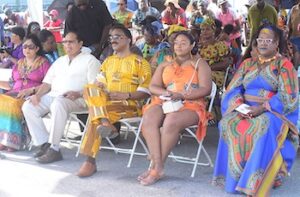
*The Afro Guyanese community is affirmed on this date in 1621. Also known as Black Guyanese, they are descendants of the enslaved African people brought to Guyana from West Africa to work on sugar plantations during the Atlantic slave trade era.
The Dutch West India Company was instrumental in the importation of African slaves, who rapidly became a key element in the colonial Guyana economy. By the 1660s, the slave population numbered about 2,500; the number of indigenous people was estimated at 50,000, most of whom had retreated into the hinterland. African slaves were considered an essential element of the colonial economy, and their working conditions were brutal. Slaves produced coffee, sugar, and cotton for the Dutch market. The mortality rate was high, and the dismal conditions led to more than half a dozen slave rebellions. The revolt, the Berbice Slave Uprising, began in February 1763. Troops defeated the freedom fighters from neighboring French and British colonies and Europe.
The demise of slavery changed colonial life. Although the international slave trade was abolished in the British Empire in 1807, slavery continued. In the Demerara rebellion of 1823, between 10 and 13,000 slaves revolted against their enslavers. Although easily crushed, the momentum for abolition remained, and by 1838, emancipation had been in effect. The system of apprenticeship created a buffer period for plantation owners to retain former slaves as laborers while providing payment. Even though there was still a demand for plantation labor, the conditions were no better post-emancipation, so former slaves favored self-reliance or skilled work. Some ex-slaves moved to towns and villages. Establishing small settlements provided the new Afro Guyanese communities an opportunity to grow and sell food, which threatened the planters' political power since the planters no longer held a near-monopoly on the colony's economic activity.
Emancipation also resulted in the introduction of new ethnic and cultural groups into British Guiana, such as Chinese and Portuguese indentured laborers, who, upon completing their contracts, became competitors with the new Afro-Guyanese middle class. The largest group of indentured laborers came from India and would later develop into a thriving and competitive class. Unlike future immigrant groups, former slaves were not granted land or passage to their home country, and this, in addition to other race-based treatment and favoritism, created tension among the ethnic groups. By the early twentieth century, most of the country's urban population was Afro Guyanese, as people living in villages had migrated to the towns for work.
Until the 1930s, Afro Guyanese people, especially those of mixed descent, comprised the bulk of the non-white professional class. Culture: Afro Guyanese are from the Akans of Ghana. Much cultural evidence supports this. Kofi, a national Afro Guyanese, was an Akan from Ghana and Quamina Gladstone. Many Afro-Guyanese dishes eaten in Guyana originated in Ghana. Coming from a wide array of backgrounds and enduring conditions that severely constrained their ability to preserve their respective cultural traditions contributed to the adoption of Christianity and the values of British colonists. Afro Guyanese are also followers of obeah, a folk religion of African origin, which incorporates beliefs and practices from all the immigrant groups. The high influence of Ghanaian culture on the Afro Guyanese can be attributed to the Dutch, historically speaking, establishing rich ties with the Ashanti Empire. It is also important to note that the western side of neighboring Suriname is also related to the Akans.
Slavery had a devastating impact on family and social structure, as individual family member was bought and sold. Marriage was not legally recognized for slaves, and even after emancipation, weddings and legal marriages were cost-prohibitive. Household compositions vary and can be matriarchal or a nuclear family unit. A popular element of Afro-Guyanese culture is the Kwe-Kwe. The Kwe-Kwe is a pre-wedding dance of West Africa, with heavy West African influence, that unites the two families and their friends. Afro Guyanese make up a significant portion of the public sector workforce.
Afro-Guyanese face challenges to private sector involvement, such as access to financing. In politics, Afro-Guyanese make up a large portion of the A Partnership for National Unity party voters. In 2017, a United Nations expert group determined that Afro Guyanese face discrimination in law enforcement, employment, and education. This date was chosen because it aligns with the month and date that Guyana gained independence from Britain.